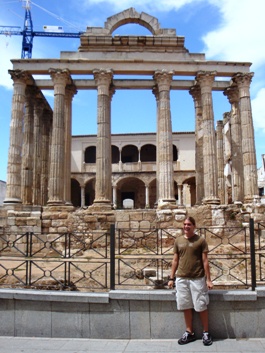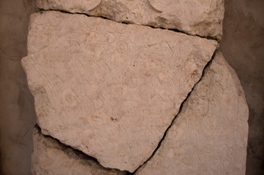 CONWAY, Ark. (Sept. 14, 2009) – Senior Will McCallum and junior Will Poff study a so-called dead language. But Latin came alive for them this summer through a workshop at the Museu Nacional de Arqueologia in Portugal.
CONWAY, Ark. (Sept. 14, 2009) – Senior Will McCallum and junior Will Poff study a so-called dead language. But Latin came alive for them this summer through a workshop at the Museu Nacional de Arqueologia in Portugal.
Poff, a classics major, and McCallum, a history major and classics minor, traveled to Lisbon for two weeks for a workshop on epigraphy, the study of inscriptions. They learned to read and translate Latin carvings from Roman ruins, some of which had been stored since excavation without having been translated.
Both men have strong backgrounds in Latin: Poff has studied it for three years, and McCallum for four years. But they still had more to learn before they could begin translating. A week of introductory lectures taught them to interpret the abbreviations that frequently appear on Roman tombstones. For example, “STTL” stands for “sit tibi terra levis” – may the earth rest light on you.
Armed with dictionaries and lists of common abbreviations, the students still struggled to translate the inscriptions, some of which had deteriorated to the point of illegibility. Linguistic variations also caused challenges.
“The regional dialects and vocabularies varied across the Roman empire,” Poff said. “There were even different case endings. Sometimes you can’t tell what the author is saying; things can be ambiguous. But it’s alluring in that way.”
During the second week, Poff and McCallum were given the liberty to peruse online epigraphy databases, searching by keywords to find artifacts that related to a theme of their choice. The project made them curators of imaginary museum exhibits, requiring them to translate and interpret the artifacts and theorize about their meanings.
 Poff focused on a study of tombstones inscribed with the word “garden”, indicating that the deceased was buried on the grounds of a private home. He hypothesized that most of the people buried at home would be women.
Poff focused on a study of tombstones inscribed with the word “garden”, indicating that the deceased was buried on the grounds of a private home. He hypothesized that most of the people buried at home would be women.
McCallum studied the tombstones of duplicarii, centurions who had earned double pay and double food rations for life by an act of bravery on the battlefield. He analyzed the stones, which often mentioned “heres” (heirs), to investigate whom they had left their belongings to.
For McCallum, Latin will likely remain an interesting hobby, a step below his true passion: law. He plans to enter law school next fall. Poff foresees a career using Latin in some way, and he feels confident that his hands-on research experience will set him apart from other undergraduates when he applies to graduate school.
The trip was sponsored and largely funded by the Hendrix Odyssey program. McCallum’s project was also underwritten by the Hendrix Murphy Foundation Programs in Literature and Language.
"Your Hendrix Odyssey: Engaging in Active Learning” is a major component of the Hendrix curriculum. The philosophy is, “You learn more when you do more.” Each student is required to complete three Odyssey experiences selected from six categories: artistic creativity, global awareness, professional and leadership development, service to the world, undergraduate research, and special projects. McCallum and Poff will earn credit for Special Projects.
Hendrix, founded in 1876, is an undergraduate liberal arts college emphasizing experiential learning in a demanding yet supportive environment. The college is profiled in Loren Pope’s book Colleges That Change Lives. Hendrix has been affiliated with the United Methodist Church since 1884. For more information, visit www.hendrix.edu.